The Guardian Council approved only six out of 80 candidates from across the political spectrum who registered to run for president in Iran's June 28, 2024 presidential election. Two of the six candidates had previously been disqualified from running -- one of them twice. The unelected body of six clerics and six scholars cleared five conservatives and one reformist in 2024.
- Amir Hossein Ghazizadeh Hashemi, a hardliner who served in parliament between 2008 and 2021 and was appointed vice president in 2021
- Saeed Jalili, a hardliner and former secretary of the Supreme National Security Council and chief nuclear negotiator between 2007 and 2013
- Masoud Pezeshkian, a reformist who has been a member of parliament from East Azerbaijan since 2008
- Mostafa Pourmohammadi, a cleric and traditional conservative who served as justice minister, between 2013 and 2017, and was interior minister between 2005 and 2008
- Mohammad Bagher Qalibaf, a traditional conservative who has been speaker of parliament since 2020 and served as mayor of Tehran from 2005 and 2017
- Alireza Zakani, a hardliner who was elected mayor of Tehran in 2021 and was a member of parliament between 2004 and 2016 and again between 2020 and 2021
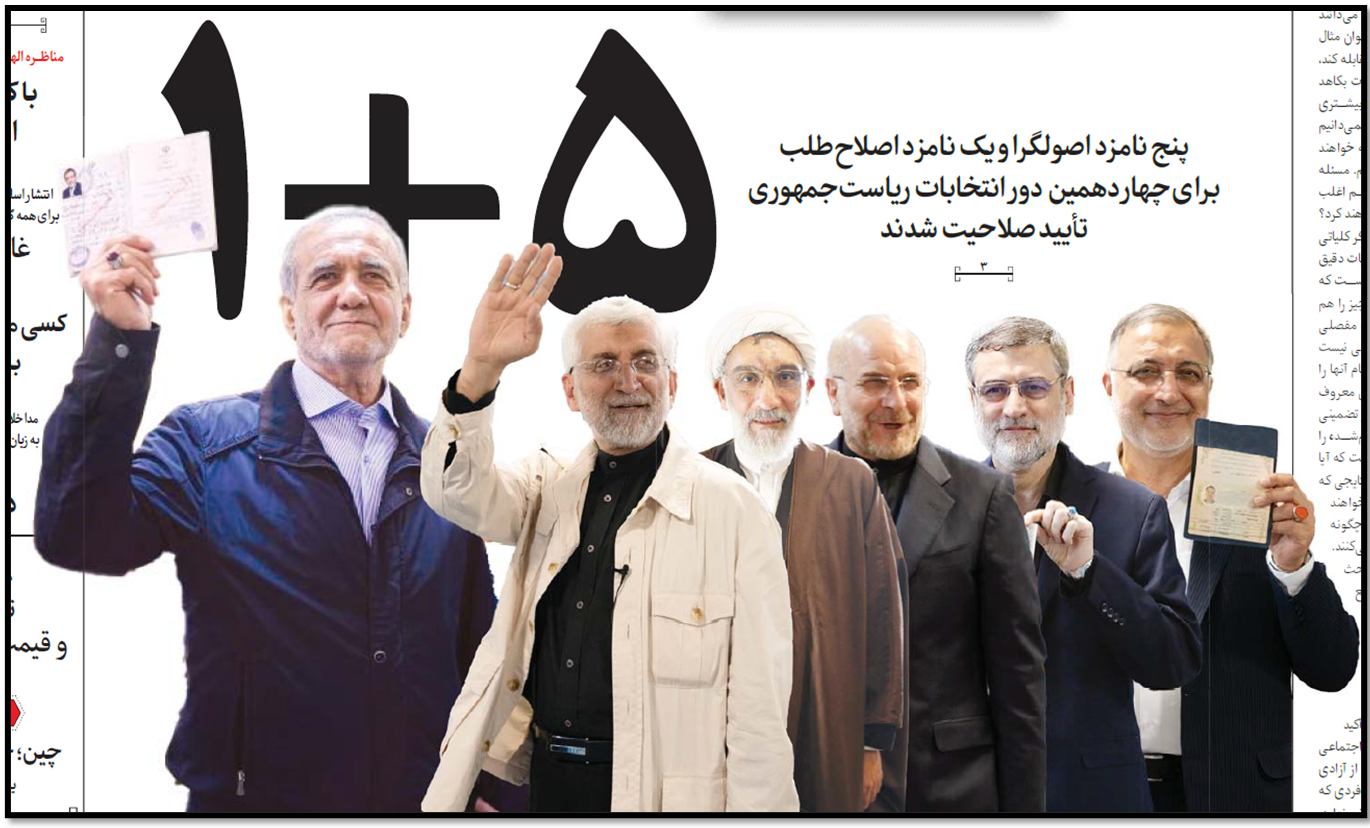
Notably, the Guardian Council only approved one cleric, Pourmohammadi, to run. Five out of Iran’s eight presidents have been clerics. But he was not the frontrunner. The most prominent candidates were Jalili and Qalibaf, who represented two different types of conservatives. Jalili has long been associated with the hardline Paydari (Steadfastness) Front, whose members have taken hawkish foreign policy positions, favored a state-controlled economy, and espoused puritanical views on social issues. Two of the other candidates, Ghazizadeh Hashemi and Zakani, were also hardliners.
Qalibaf and Pourmohammadi were traditional conservatives, a faction that has been less dogmatic than the puritanic Paydari Front. Many members had roots in the bazaari merchant class and favored a stronger private sector. They tended to be more open to the participation of reformists in politics and to engagement with the outside world. Qalibaf has led this faction in parliament for years.
The selection of mostly conservatives was in line with the seven candidates approved in the last presidential election in 2021. Pezeshkian, the lone reformist cleared to run in 2024, earned the backing of major reformist parties but faced an uphill battle within a system that has systematically marginalized reformist voices.
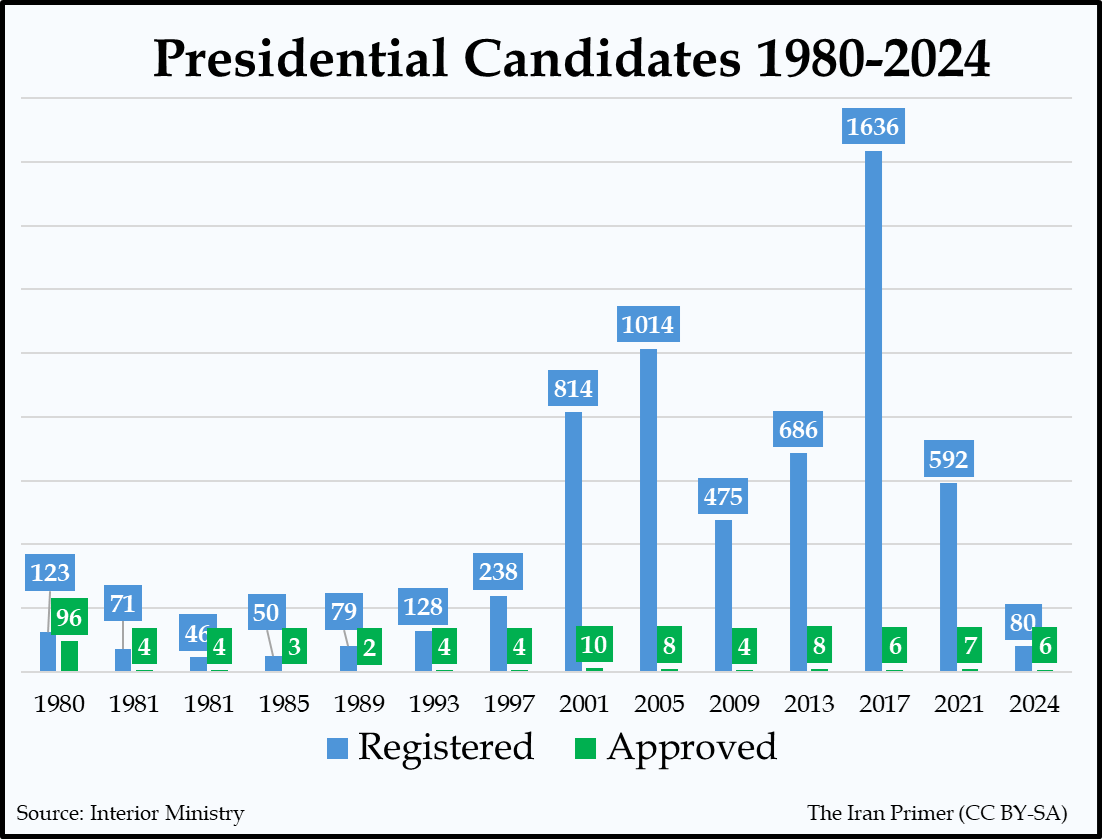
Out of the 80 candidates who registered, 56 were principlists: conservatives committed to rigid interpretations of revolutionary principles. Principlists already headed the other two branches of government, the parliament and the judiciary. They aimed to retain control of the executive branch after the death of President Ebrahim Raisi in a helicopter crash on May 19. Fifteen reformists, seven independents, and two candidates with no factional affiliation also registered. The list included five former vice presidents, 13 current or former ministers, and 53 current or former members of parliament. The Guardian Council barred prominent hopefuls, including former President Mahmoud Ahmadinejad, former First Vice President Eshaq Jahangiri, and former parliamentary speaker Ali Larijani. The body will not accept any appeals.
In a speech on June 3, Supreme Leader Ayatollah Ali Khamenei outlined desirable qualities for the next president. “The Iranian nation requires an active, hardworking, knowledgeable, and principled president who believes in the principles of the revolution in order to safeguard their interests and solidify their strategic depth in complex international equations.” Only a handful of the prominent candidates, however, had substantial foreign policy experience. On June 27, two candidates, Ghazizadeh Hashemi and Zakani, dropped out of the race. The following are profiles of the six approved candidates and four who were barred.
Saeed Jalili
Born in 1965, Jalili is a hardline diplomat and politician. He holds a doctorate in political science. During the 1980-1988 war with Iraq, Jalili volunteered for the Basij paramilitary. He earned the title of “living martyr” after he lost part of his right leg fighting on the front. In 1989, he began working in the foreign ministry and remained there for a decade. From 2001 to 2005, he was the director general of the supreme leader’s office. In 2004, he ran for a seat in parliament from his hometown of Mashhad but lost. In 2005, Jalili became an advisor to President Mahmoud Ahmadinejad. From 2005 to 2007, he was also the deputy foreign minister for European and American affairs. In 2008, he made another failed bid for a seat in parliament. From 2007 to 2013, he was both the chief nuclear negotiator in talks with major world powers as well as the secretary of the Supreme National Security Council (SNSC). During his tenure, talks failed to make progress. He had a reputation among diplomats for being dogmatic and unwilling to seriously engage.
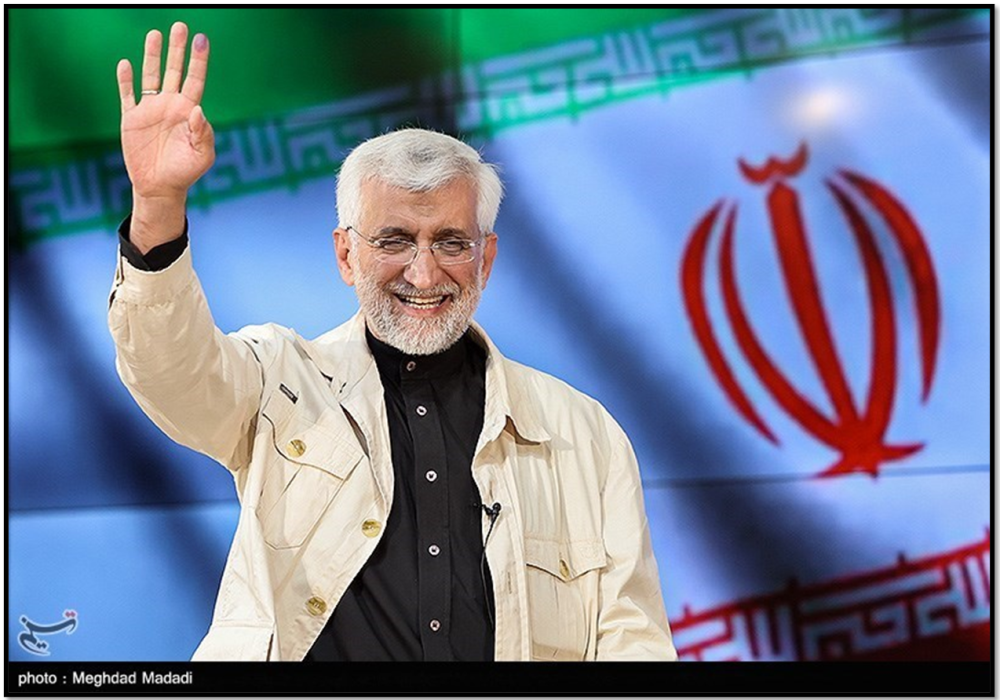
In 2013, Jalili ran unsuccessfully for president. He came in third place in a field of six candidates, with only 11 percent of the vote. Later that year, Khamenei appointed Jalili to serve on the Expediency Council, a 13-member body that resolves disputes between Parliament and the Guardian Council. He served as secretary of the Supreme National Security Council from 2007 to 2013. He has served as the Supreme Leader’s representative to the SNSC since 2014.
- On the United States: “To serve its interests, not only does the United States violate the rights of others, but also violates its claims about democracy and free trade by meddling in the internal affairs of other countries and the imposition of unilateral sanctions,” he said on Jan. 2, 2013, during a visit to India.
- On the 2015 nuclear deal: “You can't put the country in limbo to negotiate with a few world powers and [surrender to their] will,” he said on May 8, 2021. In a speech to Basij students on Dec. 2, 2020, he said that the world powers allow “a few countries to have illegal nuclear weapons and decide which other countries can have them.”
- On government transparency: “We need to devise a mechanism, under which the people oversee the government and trail it like a shadow in order to correct its mistakes and promote its good deeds,” he said in an interview on June 3, 2021.
- On foreign policy and the United States: “Every foreign policy is a paradigm, in which considered principles, goals, and values and interests and rights are described, that give shape to opportunities for cooperation or confrontation,” he said at Bushehr University on April 22, 2015. “Why do we have a special approach and outlook toward the United States of America?”
- On nuclear policy: In a letter leaked in early 2022, he argued that Iran should begin enriching uranium to 90 percent and only later “enter into direct negotiations with the United States and obtain the necessary concessions.”
- On Israel and the Palestinians: “The Zionist regime has become weaker and more isolated than any time before and its cries resemble the last moans of a dying person,” Jalili said in a May 2012 meeting with Hamas Foreign Minister Mohamed Awad in Tehran. He added that "Palestine belongs to the entire world of Islam and should be liberated” and “the existing conditions in Gaza, including shortage of fuel and electricity, amount to a human crisis and countries which remain silent toward this issue are culprits in this crime against humanity.”
Masoud Pezeshkian
Born in 1954, Pezeshkian is a reformist politician and a cardiac surgeon. He studied medicine and surgery at Tabriz University of Medical Sciences and later became a heart surgeon at Iran University of Medical Sciences. He served as deputy health minister during President Khatami’s first term from 1997 to 2001 and then as health minister during his second term from 2001 to 2005.
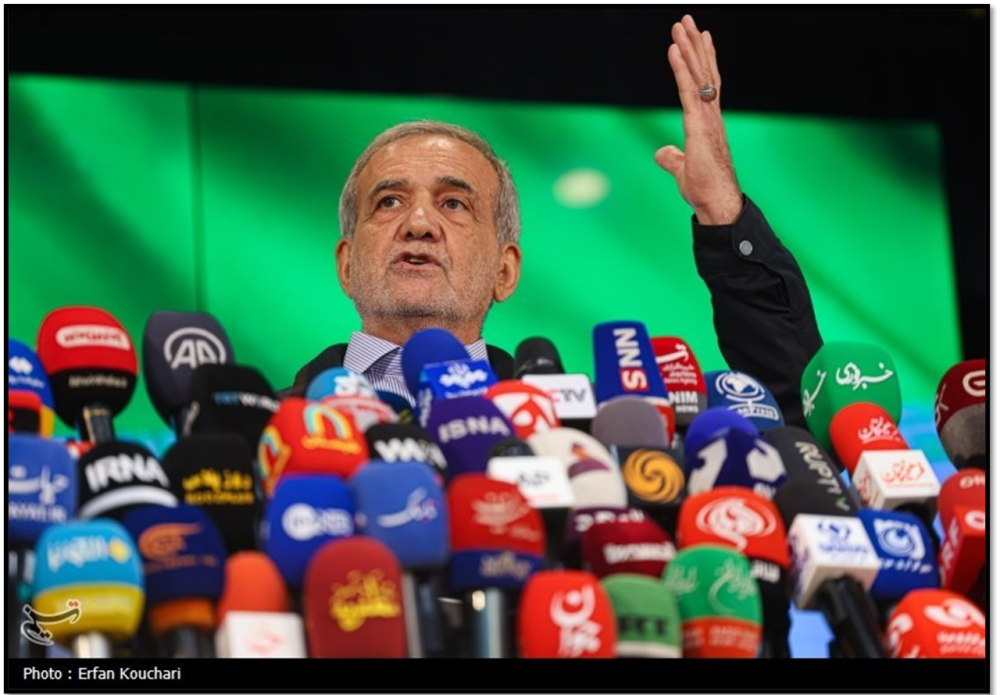
In 2006, he won a seat in Parliament representing the Tabriz, Osku, and Azarshahr district of East Azerbaijan province. He was reelected four consecutive times. He served as first deputy speaker from 2016 to 2020 and headed the Azeri Caucus. Azeris, concentrated in the northwest, are the second-largest ethnic group in Iran after Persians. Pezeshkian is fluent in Azeri as well as Kurdish and has supporters among both ethnic groups.
Pezeshkian registered for the 2021 presidential election but was not cleared by the Guardian Council. He criticized the barring of candidates from elections and lack of competition. Pezeshkian was one of the few prominent reformists approved to run for Parliament by the Guardian Council in 2024. He attributed his qualification to a good word from the supreme leader.
- On the United States: “One who wants to negotiate does not impose sanctions. A government that claims [to be ready] for talks, does not tear up previous talks,” he told fellow lawmakers on June 21, 2019. “Such people should never be trusted.”
- On the Revolutionary Guards: “Without the existence of the dear Guards we were never able to experience security and the Guards caused us to stand up against all the conspiracies hatched by the enemies,” he said on April 22, 2020 in Tehran.
- On internet restrictions: “If we continue in this way, in the not-too-distant future, we will create a country that will have a significant gap with the advanced world. We always focus on the wrong uses of the internet, while we should not deprive good individuals because of the wrongdoings of some,” he warned on Nov. 21, 2023.
- On freedom of expression: “We are moving toward a unilateral governance that does not allow criticism,” he said in an interview on April 20, 2021. “We should allow for various ideas to be presented and the people should not be afraid of voicing their true demands.”
- On compulsory hijab: After the death of Mahsa Amini in police custody in September 2022, he questioned the enforcement of the Islamic dress code. “The goal of this law is to improve chastity and modesty. We need to examine whether our intervention has made things better or worse. If it has made things worse, we should stop,” he warned. “We want to implement religious faith through the use of force. This is scientifically impossible.”
- On the economy: “People are now under immense pressure, and they can only bear this pressure to a certain extent. Once that limit is exceeded and they can no longer afford to live, the only path forward is not a good one,” he told ILNA news agency on April 11, 2024.
Moustafa Pourmohammadi
Born in 1960, Pourmohammadi is a conservative cleric who holds a degree in Islamic law equivalent to a doctorate. He became a prosecutor of the Revolutionary Court in 1979. He left the position in 1987 to serve as deputy intelligence minister under Ali Fallahian during Rafsanjani’s presidency. He held the position until 1999. He simultaneously served as acting deputy minister of information from 1997 to 1999.
Human Rights Watch and other organizations have alleged that Pourmohammadi played a role in the 1988 prison massacres, which killed some 5,000 political prisoners, and the 1998 chain murders of dissident intellectuals. In 2016, audio leaked of a former official criticizing Pourmohammadi and others as “criminals” for the 1988 executions. But he showed no remorse. “We're proud to have carried out God's order regarding the hypocrites,” Pourmohammadi said in 2016.
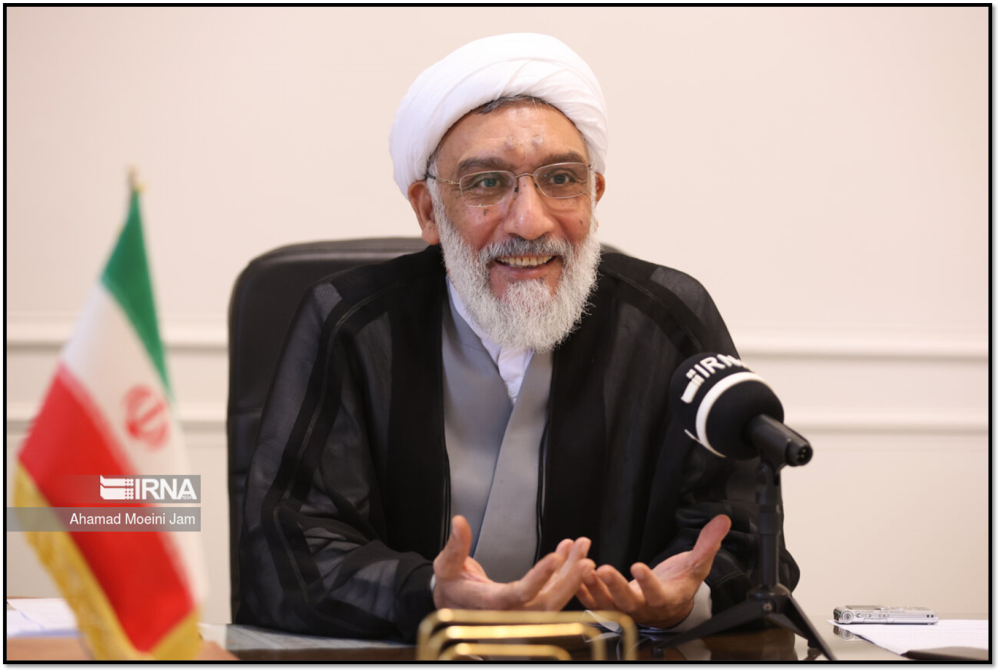
Starting in 2000, Pourmohammadi taught political science at Imam Sadegh University, a private school known for educating the next generation of conservative leaders. Supreme Leader Khamenei appointed Pourmohammadi to head the political and social department of his office in 2003, which indicated a level of trust and confidence.
In 2005, former President Ahmadinejad appointed Pourmohammadi as interior minister. He held the position for three years and was then named head of the National Inspection Organization. He played a major role in uncovering a 3 billion rial ($120,000) embezzlement case connected to the Iran Insurance Company. Pourmohammadi was a vocal critic of Ahmadinejad’s economic plan, especially the removal of subsidies for consumers. Pourmohammadi served as justice minister under President Rouhani from 2013 to 2017 but did not keep the portfolio during his second term.
- On election turnout: “People themselves should be interested in participating in the elections, and this depends on the level of their satisfaction,” he said in an interview in July 2023. “We must analyze the situation realistically. Today, popular satisfaction has declined, and many government entities are responsible.” He also acknowledged rifts in society. “The young generation has distanced itself from us,” and that “low turnout is a defeat for all of us.”
- On the death penalty: “These last years, the quantity of executions has not been effective,” he said in October He called for a revision of the law and “alternative penalties.” Yet he ruled out complete abolishment of capital punishment because “there are corrupt people in the country for whom there is no alternative to execution.”
- On Iran’s nuclear program: “I want to reiterate our position that we develop a nuclear program only for peaceful purposes and that is our legal right,” he said during a visit to Beijing in September 2007. Iran “will conduct nuclear activities legally, abiding by a series of international laws and regulations.”
Mohammad Bagher Qalibaf
Born in 1961 to a dried-fruit seller, Qalibaf is a mainstream conservative politician who holds a doctorate in political geography from Tehran University. He joined the Revolutionary Guards during the 1980-1988 war with Iraq. He played a large role in recapturing the city of Khorramshahr in 1982 and quickly moved up the ranks from brigade commander to division commander. During the war, he reportedly developed close ties to Khamenei and other senior officials. Trained as a pilot, he was commander of the Revolutionary Guards Air Force from 1997 to 2000. In an open letter, Qalibaf and 23 other senior IRGC commanders demanded that President Khatami crackdown on the 1999 student protests in Tehran. “We declare that our patience has come to an end, and we will not permit ourselves any more tolerance in the face of your inaction,” they warned.
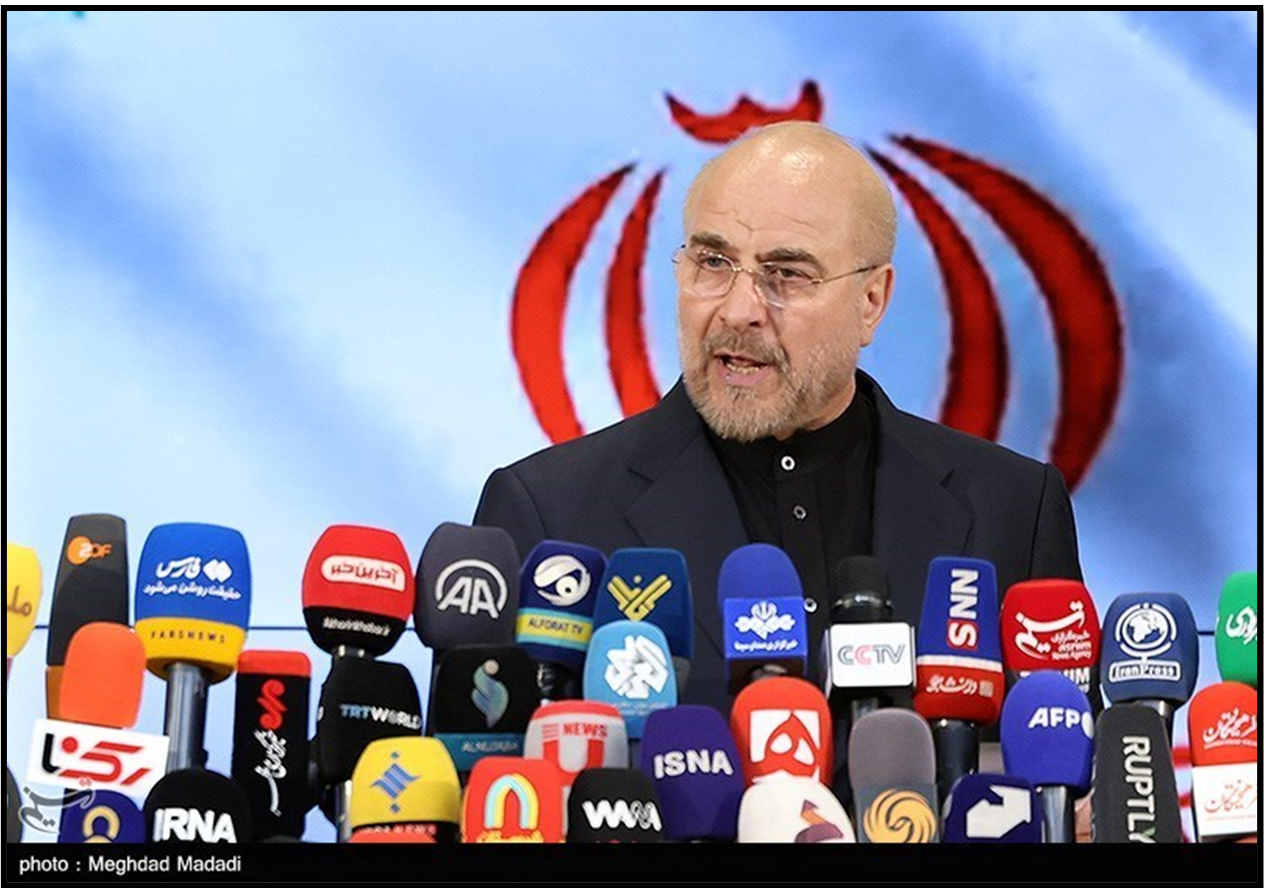
Khamenei appointed Qalibaf to be the national police chief in 2000. In a leaked recording, he later bragged about ordering officers to fire at protesters during campus demonstrations in 2003. Qalibaf ran a failed presidential bid in 2005 but rebounded by becoming Tehran’s mayor the same year. He expanded public transportation and urban green spaces. Qalibaf placed second in the 2013 presidential race, with less than 17 percent of the vote.
In 2016, Qalibaf’s reputation was questioned by an investigation into alleged corruption among city officials. He also faced criticism in January 2017 when the Plasco building, one of Tehran’s oldest high-rises, was set ablaze and eventually collapsed. Dozens of fire-fighters died. Many Iranians accused the mayor of mismanagement and called for his resignation. Qalibaf made another attempt for the presidency in 2017 but dropped out towards the end of the campaign to endorse hardliner Ebrahim Raisi, who went on to lose to Rouhani in a landslide defeat.
In the 2020 parliamentary elections, Qalibaf finished first in Tehran, winning more than 1.2 million votes, the most of any candidate in the capital. He went on to become speaker. Qalibaf, however, struggled in the 2024 election. He came in fourth place with just 447,905 votes. Qalibaf trailed three candidates from the ultra-conservative Paydari Front. He registered for the 2024 presidential election at the last minute. “If I didn’t register, the work we have started for resolving economic issues of the people in the popular government [of Raisi] and the revolutionary parliament, and is now at the stage of fruition, would remain unfinished,” he said on June 3, 2024. For years, Qalibaf has reportedly had strong support from the Revolutionary Guards and the Office of the Supreme Leader.
- On the United States and the West: “Our strategy in confronting the terrorist America is to finish the revenge for martyr Soleimani's blood… [This will entail] the total expulsion of America’s terrorist army from the region,” he said in a televised speech on May 31, 2020. The new parliament “considers negotiations with and appeasement of America, as the axis of global arrogance, to be futile and harmful.”
- On the economy: S. sanctions are “responsible for at most 30 percent” of the economic hardship Iranians currently face, he said on Feb. 19, 2020 before parliamentary elections. “The other 70 percent is due to mismanagement and inefficiency in governing the country.” He also noted that the public sector was “inefficient, corrupting” and had “the highest costs with the least benefits.”
- On class divisions: “I am the representative and the voice of the 96 percent who are faced with the capitalist [top] four percent,” he said in May 2020.
- On the dress code: “What right do we have to say that we don't let a woman ride the subway when she is not wearing hijab properly?” he asked rhetorically on television on Jan. 5, 2023. He implied that there was a middle ground between no Islamic dress code and overly stringent enforcement.
- On the United States, Israel and war in Gaza: "We clearly consider the main culprit of all these crimes to be the criminal America, and all these crimes are committed with the orders and support of the United States,” he said during a national address in Tehran on Nov. 4, 2023.
- On multilateralism in foreign policy: “In today’s world, multilateralism and global solidarity are not just an option; rather, they are the most important way out of global challenges and attaining sustainable and fair development, peace and security for future generations of humanity,” he said in a speech to the Inter-Parliamentary Union in August 2020.
Amir Hossein Ghazizadeh Hashemi
Born in 1971, Ghazizadeh Hashemi is a hardline politician. He is a doctor with a specialty in head and neck surgery. He was formerly chancellor of Semnan University of Medical Sciences and Health Services. In 2008, he was elected to Parliament for Mashhad and Kalat in Razavi Khorasan province. He was reelected in 2012, 2016 and 2020. In 2016, Ghazizadeh Hashemi was chosen as first deputy speaker in Parliament under speaker Ali Larijiani. As deputy speaker, Ghazizadeh Hashemi expressed staunch support for Palestinian militants, including Hamas and Palestinian Islamic Jihad. In September 2020, he denounced the normalization of relations between the United Arab Emirates and Israel as “apostasy.”
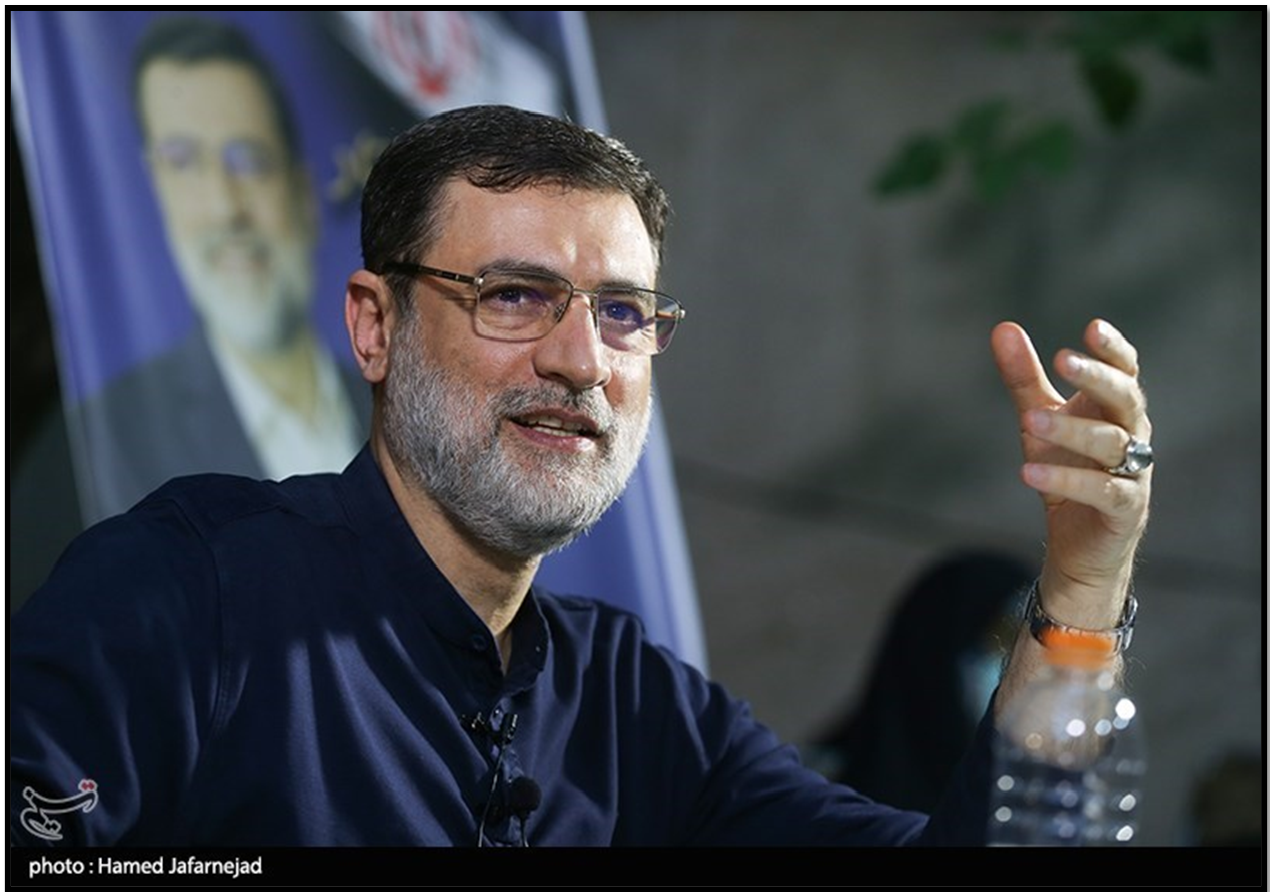
Ghazizadeh Hashemi demanded that the Rouhani government take a harder line with the West after the Trump administration withdrew from the 2015 nuclear deal in 2018. He called INSTEX – the European financial mechanism meant to bypass U.S. sanctions – a “disgrace” and said that there was “no hope” that Europeans would be able to save the nuclear deal. Ghazizadeh Hashemi also pushed for Iran to withdraw from the Non-Proliferation Treaty and expel nuclear inspectors if U.N. sanctions were reimposed on Iran. In December 2020, he backed legislation that required the government to enrich uranium to 20 percent – above the 3.67 percent limit allowed in the nuclear deal. Hashemi was pessimistic about the prospects of negotiations with the Biden administration. “How the agreement will be implemented in the text must be clear, otherwise the agreement is useless,” he said in May 2021.
Ghazizadeh Hashemi ran for president in 2021 but came in fourth place with less than four percent of the vote. A few months later, President Raisi appointed him vice president and head of the Foundation of Martyrs and Veterans Affairs, a government body responsible for the welfare of veterans and their families. Ghazizadeh Hashemi dropped out of the presidential race on June 27, 2024.
- On reviving the 2015 nuclear deal: "If the outcome of the Vienna talks only leads to the signing of two texts, this agreement is worthless…The way the agreement will be implemented in the text must be clear, otherwise the agreement is useless and just good news that does not lead to practical measures, he said in an interview with IranPress on May 19, 2021. “Iran fulfilled its obligations under the agreement; however, it was the European parties who failed to fulfill their commitments. Therefore, staying in such a situation is, strategically, to the detriment of national interests and authority of the Islamic Republic of Iran, he told Mehr News Agency on Dec. 6, 2020.
- On the economy: “Our rules about commerce, insurance, and banking should be restructured. However, now the problem is that the government’s knee is on people’s neck,” he said during the first presidential debate on June 6.
- On government regulation: “Our rules about commerce, insurance, and banking should be restructured. However, now the problem is that the government’s knee is on people’s neck,” he said during a presidential debate on June 5, 2021.
- On U.S. military presence in the Persian Gulf: “Iranian forces are able to catch the US’ atomic submarines and Tehran is not worried about U.S. military activities in the Persian Gulf waters… U.S. and U.K. have created bases in Persian Gulf littoral states and everywhere that these two countries are present means Israel has infiltrated there,” he said in an interview with Arabic RT on Dec. 22, 2020.
- On Israel-UAE normalization: “One of Islam’s obligations is to defend the oppressed and counter oppression. When the Emirates officially establishes and declares relations with Israel, this, in fact, amounts to the issuance of a statement declaring the apostasy of this country,” he said in an interview with Fars News Agency on Sept. 5, 2020.
On the presidency: “We need to revive the prime ministerial system in order to be able to monitor the administration,” he said in an interview on Sept. 6, 2020. “At the time being we cannot go against the President who is a political symbol elected by the people. In a parliamentary system we can topple the administration many times. Sometimes we need to change individuals quickly.”
Alireza Zakani
Born in 1965, Zakani is a conservative politician and a medical doctor. He holds a doctorate in nuclear medicine. During the Iran-Iraq war, he served in the Irregular Warfare Headquarters, a paramilitary wing. He rose to the rank of deputy intelligence commander in the 27th Mohammad Rasoul Allah Division. After the war, Zakani became the head of the Student Basij Organization, a volunteer paramilitary organization operating under the Revolutionary Guards. Zakani managed all Basij student groups in Tehran province.
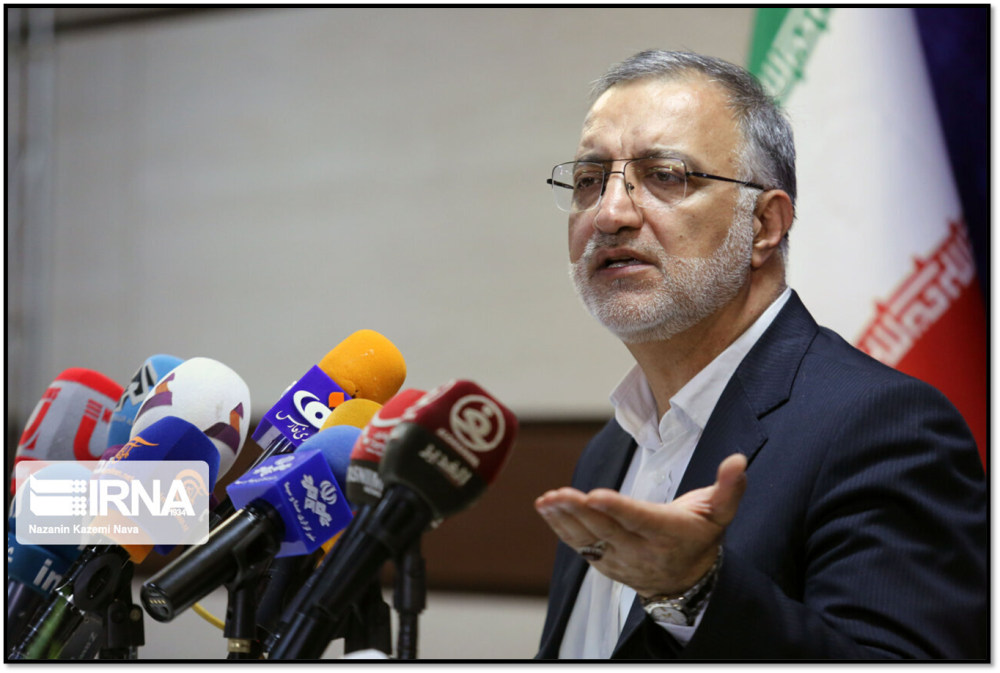
In 2004, Zakani was elected to Parliament representing Tehran; he was reelected twice. In 2005, he worked as campaign director for Qalibaf’s failed presidential campaign. Zakani ran for president in 2013 and 2017, but was disqualified by the Guardian Council both times. In Parliament, Zakani was a vocal critic of the Rouhani administration. In 2015, he demanded that Parliament review the 2015 nuclear deal before ratifying it. In September 2015, he accused Oil Minister Bijan Zanganeh of financial corruption and later criticized the minister for signing a multibillion-dollar contract with French energy firm Total. Zakani lost his seat in parliament in 2016, but was reelected in 2020.
In 2021, Zakani ran for president but withdrew on the eve of the election to endorse Raisi. A few months later, Tehran’s city council elected him mayor. Since 2023, he has also served as the Presidential Aide for Tehran Social Damages Affairs and Management. Zakani dropped out of the presidential race on June 27, 2024.
- On the 2015 nuclear deal: Rouhani’s negotiating team “failed to get the rights of the Iranian people from the American wolves,” he said on Oct. 11, 2015.
- On Iran’s nuclear program: “Westerners have a material understanding, and among these issues, the nuclear ability has the capacity to be traded. The profit of this transaction can be minimal or maximum,” he said in an interview on May 28, 2021.
- On mandatory hijab: “The efforts to punish women without the hijab should be doubled,” he said in May 2024.
- On the economy: “My government will serve the people, and I will distribute wealth fairly,” he said during a presidential debate on June 8, 2021. “I will confront those involved in economic corruption; our enemy is poverty, corruption, and discrimination.”
Barred Candidates
Mahmoud Ahmadinejad
Born in 1956, Ahmadinejad is a hardliner populist and former president. The son of a blacksmith, he holds a doctorate in traffic and transport. He organized anti-government demonstrations in the run-up to the 1979 revolution. He volunteered for the Basij paramilitary and joined the Revolutionary Guards in 1986 amid the 1980-1988 war with Iraq. After the war, Ahmadinejad served as governor general of the cities of Khoi and Mako in West Azerbaijan province and then an advisor to the governor general of Kurdistan province. In 1993, he was appointed governor general of Ardabil province. After the end of his term in 1997, he lectured at IUST.
In 2003, the Tehran city council – dominated by conservatives – appointed Ahmadinejad as mayor. In 2005, he ran for president. In a runoff, he defeated former President Hashemi Rafsanjani (1989-1997) with 61 percent of the vote. Ahmadinejad was the first non-cleric president in 24 years. Ahmadinejad won reelection in 2009 with 63 percent of the vote, but millions of people took to the streets to dispute the results. Security forces brutally suppressed the so-called Green Movement demonstrations, the largest since the 1979 revolution.
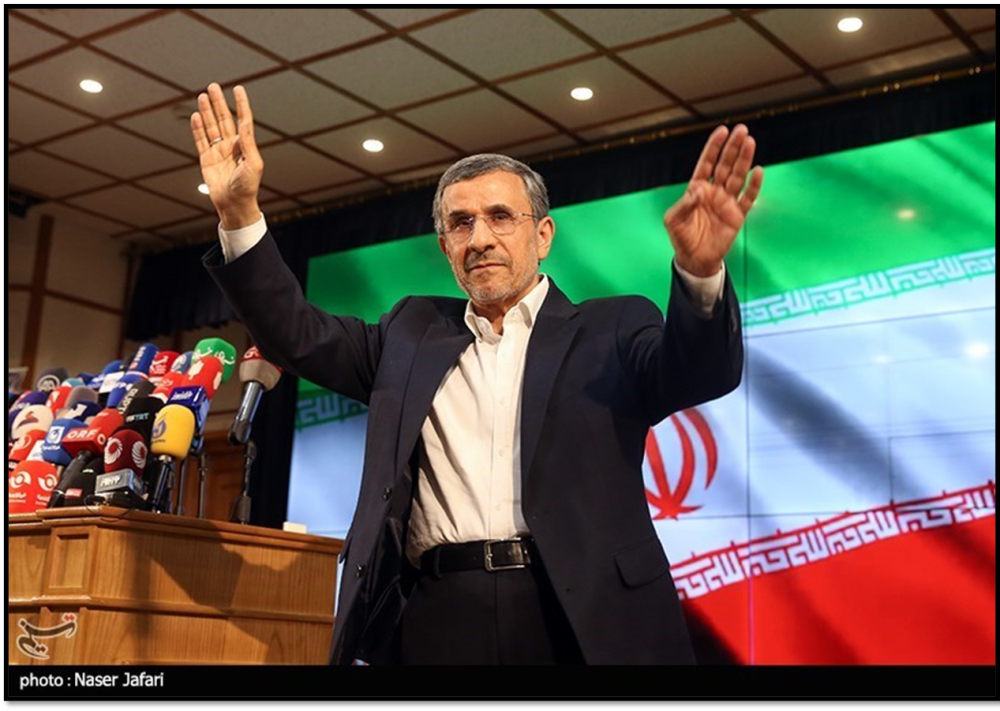
Much of Ahmadinejad’s presidency (2005-2013) coincided with high oil prices, but his administration mismanaged the economy. He tried to improve the lives of working-class Iranians with handouts but many of his pet projects were failures. He also replaced many bureaucrats with members of the security services, which increased the political influence and economic power of the Revolutionary Guards. On the international stage, Ahmadinejad took a confrontational stance with inflammatory rhetoric about the West, Israel, and the Holocaust. Iran also faced biting international sanctions over its nuclear program that damaged the economy.
Ahmadinejad often broke ranks with mainstream conservatives, angered clerics with his messianic views, and attempted to gain additional power within the political system. Khamenei stepped in several times to restrain him. In September 2016, Supreme Leader Khamenei advised Ahmadinejad not to stand for election again. “It will create bipolar opposites and divisions in the country which I believe is harmful,” the supreme leader said. Ahmadinejad ignored his guidance and registered to run in 2017 and in 2021. The Guardian Council rejected him both times.
- On the 9/11 attacks: “Some segments within the American government orchestrated the attack to reverse the declining American economy and its grips on the Middle East in order to save the Zionist regime,” he said at the United Nations in September 2010.
- On the Holocaust: “They [Western governments] launched the myth of the Holocaust,” he said in Tehran in September 2009. “They lied, they put on a show and then they support the Jews. The pretext for establishing the Zionist regime is a lie … a lie which relies on an unreliable claim, a mythical claim, and the occupation of Palestine has nothing to do with the Holocaust.”
- On Israel: “Anybody who recognizes Israel will burn in the fire of the Islamic nation's fury,” he told the “World Without Zionism” student conference in October 2005. In April 2006, he said that the “fake regime cannot logically continue to live” and called on Europe to “let the Jews go back to their own countries.”
- On suicide bombers: “Iran can recruit hundreds of suicide bombers a day,” he said on April 1, 2007, during a visit to a camp where suicide bombers were trained during the 19801-88 war with Iraq. “Suicide is an invincible weapon. Suicide bombers in this land showed us the way, and they enlighten our future.”
On capitalism: “The demanding liberal capitalism and transnational corporations have caused the suffering of countless women, men and children in so many countries,” he said in an address to the U.N. General Assembly on Sept. 21, 2010.
Abdolnasser Hemmati
Born i 1957, Hemmati is a reformist politician and banker. He holds a doctorate in economics from the University of Tehran. During the 1980-1988 war with Iraq, Hemmati was the director general of the news department at Islamic Republic of Iran Broadcasting (IRIB), a state media outlet. Hemmati was placed in charge of war messaging. After the war, he served as vice president of IRIB from 1989 to 1994. In 2001, Hemmati was appointed to the economic committee of the Supreme National Security Council, a position he held until 2006. Hemmati left for the private sector, but he retained ties with Supreme Leader Khamenei. He was CEO of Bank Sina from 2006 to 2013 and CEO of Bank Melli from 2013 to 2016. Both banks were sanctioned by the Obama administration for servicing entities involved in Iran’s nuclear and ballistic missile programs; both banks were removed from the sanctions list as part of the 2015 nuclear deal.
In June 2018, Hemmati was named ambassador to China. But he was quickly recalled and appointed to head the Central Bank of Iran (CBI) after the prior governor, Valiollah Seif, resigned over allegations of fraud and mismanagement. Hemmati took over the Central Bank during the height of the Trump administration’s “maximum pressure” campaign, which included U.S. sanctions on the Central Bank for supporting the Revolutionary Guards and Hezbollah in Lebanon. As CBI governor, Hemmati revamped Iran’s currency to simplify financial transactions. He also negotiated the purchase of COVID-19 vaccines from Japan and South Korea using Iranian assets frozen in both countries.
In 2021, Hemmati ran for president. Rouhani's cabinet dismissed Hemmati from his position at the Central Bank because he would not be able to fulfill his duties while campaigning. During the campaign, Hemmati identified as a reformist while also downplaying the importance of labels. “Reformist and principlist (hardliner) no longer makes sense; I am your humble voice,” he said during an event on June 4 on Clubhouse, an audio-based platform. Hemmati also said that he wanted to be the voice of the “silent majority.” He came in a distant second place to Raisi in the election with 8.42 percent of the vote.
- On mandatory hijab: “Why should we send an SMS to educated young women, telling them they had not followed hijab law and stress them?” he asked rhetorically during a television interview on June 3, 2021.
- On social restrictions: “Control over people’s lives should be lifted,” he said during a presidential debate on June 8, 2021.
- On trade: “Iran must engage in trade with the rest of the world; it cannot survive individually,” he said during a presidential debate on June 12, 2021.
- On the United States: “In general, I do not reject [the possibility of talks with the United States] but it will depend on the U.S.’s behavior and deeds,” he said in an interview with the Financial Times in June 2021.
- On the 2015 nuclear deal: “I think we haven't seen anything serious from Mr. Biden's side yet,” he said in June 2021. “They first need to go back to the (nuclear deal) that they withdrew from. If we see the process and more confidence is built, then we can talk about that.”
- On the S. assassination of General Qassem Soleimani: “His efforts were mostly focused on standing up against the United States' pressures on the country, and we, as the economic sector of the nation, are obliged to follow his efforts in order to counteract the enemy's economic pressures,” he said at a memorial service for Soleimani in January 2020.
- On the central bank: “The main task of the central bank is to stabilize prices and then to prevent a recession and maintain production, however, according to economic theory, clearly it is not possible to achieve many goals with a limited number of tools,” he wrote on Instagram on Oct. 24, 2020.
- On the economy: The “coronavirus pandemic caused the country's economic growth, which was on the verge of becoming positive, to become negative again, but the resilience of the Iranian economy helped it to overcome the recession after a while and the country's economic growth became positive again,” he said on state television on March 27, 2021.
Eshaq Jahangiri
Born in 1958, Jahangiri is a reformist politician. He graduated from the University of Kerman with a degree in physics. He later earned a doctorate from Islamic Azad University in industrial management. Jahangiri participated in the 1979 revolution and then entered politics. He served two terms in parliament starting in 1984 and was governor of Isfahan from 1992 to 1997. Under former President Mohammad Khatami, a reformist, Jahangiri served as minister of industries and mines from 1997 to 2005.
In 2013, newly elected President Hassan Rouhani appointed Jahangiri as his first vice president. In 2017, Jahangiri ran for president. He acted as a wingman for Rouhani during presidential debates by defending his administration’s achievements, including the 2015 nuclear deal and stabilization of the economy. He recalled that Ahmadinejad’s administration treated the banks like a personal treasury and that Rouhani’s government had to clean up the mess. Jahangiri did not hesitate to call out hardliners for monopolizing political power. “You have deprived reformists of all of their rights,” he told hardliners during the first debate. “You don’t even want them to have a representative in the election. I am here representing reformists to highlight what you have done with this movement,” he said. Jahangiri withdrew, as expected, and urged voters to support Rouhani. He told supporters that he had wanted to “make the voice of reformists heard.” Jahangiri continued as first vice president until the end of Rouhani’s term in 2021.
- On interference in Iran’s domestic affairs: “Some countries in the region should know that they will not have an easy life in the region if clues are found that show they intervened to create unrest in Iran,” he told Fars News Agency in November 2019.
- On U.S. sanctions: “Despite America's pressure ... and its imposed sanctions on our oil exports, we still continue to sell our oil by using other means ... when even friendly countries have stopped purchasing our crude fearing America's penalties,” he told state media in December 2015.
- On terrorism: “The voice of humanity should rise against terrorism in every part of the world; the international reaction to the killing of people in Iraq, Syria and Lebanon should be as strong as its opposition to the incidents in Paris or other parts where innocent people are victimized,” he said in response to the November 2015 Paris attacks.
Ali Larijani
Born in 1957, Larijani is a mainstream conservative politician. He has a prestigious background as the son of Ayatollah Mirza Hashem Amoli and son-in-law of Ayatollah Morteza Motahari. His father was a prominent religious authority. His brother is a former judiciary chief who has headed the Expediency Council since 2018. Larijani studied mathematics and computer science at Sharif University of Technology. He earned advanced degrees in philosophy from Tehran University. After serving as a commander in the Revolutionary Guards in the 1980s, he held a variety of positions in the state-run Islamic Republic of Iran Broadcasting (IRIB), the Ministry of Labor and Social Affairs, and the Ministry of Telecommunications. From 1991 to 1993, he served as Minister of Guidance and Islamic Culture. From 1994 to 2004, he was President of IRIB. From 1997 to 2008, he served on the Expediency Council, a body charged with resolving disputes across different parts of the government.
In 2004, Larijani became an advisor to Supreme Leader Khamenei. In 2005, he made an unsuccessful run for president with less than six percent of the vote. Later that year, Khamenei appointed him Secretary of the Supreme National Security Council, replacing Rouhani. In that capacity, Larijani acted as lead negotiator on Iran’s nuclear program. But he resigned in 2007, reportedly over tactical disagreements with President Ahmadinejad concerning the nuclear talks. In 2008, Larijani ran for Parliament and won a seat representing Qom. He went on to become parliamentary speaker and held the position until mid-2020.
Larijani was attacked by hardliners for cooperating with Rouhani’s government. He supported the 2015 nuclear deal between Iran and the world’s six major powers. He regarded it as a “national achievement” even though Iran did not get everything it wanted. In May 2016, he lauded the Rouhani administration for acting more lawfully and more cooperatively with Parliament than the Ahmadinejad administration. He rejoined the Expediency Council when his term in Parliament ended in mid-2020. He registered to run for president in 2021 but was barred by the Guardian Council.
- On mandatory hijab and anti-government protests: “These are issues that should be considered with gentleness and tolerance,” he said in an interview with Hamshahri Online on Oct. 12, 2022. “It's like a person has a migraine, but we write a prescription for him like a person with a heart disease... On the issue of hijab, we were in this situation. This is not the right way to pay attention to the issue of hijab, in this situation when people are having economic problems and once again highlighting the issue of hijab. This was both inappropriate and not the right way.”
- On regional tensions: “I believe that there are a number of neighbors – Iran’s neighbors – that have their own internal problems, and they are trying to hide those problems behind a kind of ‘Iranophobia.’ Let me ask you a question: in the last 200 years, has Iran invaded another country? Have we invaded or attacked an Arab country? But actually it was Iran that was attacked by an Arab country. I mean by Iraq and by Saddam Hussein,” he told the Fourth World Conference of Parliament Speakers at the United Nations on Sept. 1, 2015.
- On the Palestinians: “We are honored that our help has material and military aspects, and these Arab countries that sit and hold meetings should know that the nation of Palestine does not need words or meetings... Our message is that if Arab countries want to help the nation of Palestine, they should give military assistance,” he said on Nov. 21, 2012.
- On the nuclear deal: “This is definitely a trade-off, and no one would claim a maximal gain for Iran in the JCPOA; however, the major issues of concern for Iran had been well-balanced vis-à-vis the Western demands, which is first to retain the enrichment right and second removal of sanctions, which will not be without its own consequences,” he told Parliament’s Joint Budget Commission on Aug. 8, 2015.
Photo Credits: Ghazizadeh Hashemi via Tasnim News Agency; Jalili via Tasnim News Agency; Pezeshkian via Tasnim News Agency; Jannati via IRNA;
